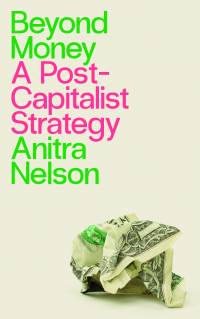Beyond Money: A Postcapitalist Strategy
Beyond Money: A Postcapitalist Strategy
By Anitra Nelson
Mainstream education is oriented to training students in every way for a future role in capitalist workplaces. Transformative learning and emancipatory education are significant alternatives for skilling ourselves to create and experiment with postcapitalist futures. Many activist scholars inhabit such spaces. My recent work Beyond Money: A Postcapitalist Strategy (2022) is a case in point.
I wrote the book as an intervention in movement debates around ideal futures. And as a counterpoint to dystopian visions such as highly automated, digitally-oriented societies with regulated, modified or quasi-markets, or as a state-regulated quasi-ecosocialism maintaining some level of market activities. Associated articles and reviews in Radical Ecological Democracy and webinars co-organised by Global TapestryThe weaving of networks of Alternatives of AlternativesAre activities and initiatives, concepts, worldviews, or action proposals by collectives, groups, organizations, communities, or social movements challenging and replacing the dominant system that perpetuates inequality, exploitation, and unsustainabiity. In the GTA we focus primarily on what we call "radical or transformative alternatives", which we define as initiatives that are attempting to break with the dominant system and take paths towards direct and radical forms of political and economic democracy, localised self-reliance, social justice and equity, cultural and knowledge diversity, and ecological resilience. Their locus is neither the State nor the capitalist economy. They are advancing in the process of dismantling most forms of hierarchies, assuming the principles of sufficiency, autonomy, non-violence, justice and equality, solidarity, and the caring of life and the Earth. They do this in an integral way, not limited to a single aspect of life. Although such initiatives may have some kind of link with capitalist markets and the State, they prioritize their autonomy to avoid significant dependency on them and tend to reduce, as much as possible, any relationship with them. and Radical Ecological Democracy have promoted discussion around the key place of money and markets in a socially just and ecologically sustainable future. The book is being publicised widely in a range of forums.
I have an enduring interest in monetary and autonomist money-free economies, a major theme in my activism and academic work. I have experimented with no/low money models and practices. Decades ago I lived in a commune at a tricky point when the direction and content of the collective work of members and their collective purse became controversial. My personal and scholarly interest in eco-collaborative housing culminated in writing a book Small is Necessary: Shared Living on a Shared Planet (2018), the final chapter of which leads in a nonmonetary direction. Moreover, that book is really about degrowth, even if ‘degrowth’ is never mentioned. Exploring Degrowth: A Critical Guide (2020) written with Vincent Liegey proposes an ‘unconditional autonomy allowance’ that could be an entirely nonmonetary or in-kind right to basic needs collectively produced locally.
I have belonged to four local/labour exchange trading systems (LETS) in three distinct areas of Australia and to one Community Exchange System — developing a critique of such alternative currencies in Beyond Money.
When I lived in the Blue Mountains (NSW Australia) I co-founded a nonmonetary Fruit and Nut Tree network, to share harvests, knowledge and skills in growing and maintaining these plants. It incorporated trees on public and private property. It was inspired by an existing project that still operates where I live now. The community-based Growing Abundance Harvest Project enables harvest and pruning volunteers to keep one-third of their pickings, while the owners of the fruit trees get another third, and the final third goes to local community organisations, such as schools and regular community lunches. Pruners reduce pests and disease regionally and pass on removed material to local free range chickens.
An occasional speaker at Melbourne Free University, a couple of years ago I convened Castlemaine Free University in my home town, currently operating once a month with intentions for more regular activities. Again the venue, speakers, and membership is free. Most speakers are selected to talk about their activist and creative works that promote socio-political and economic justice and ecological sustainability.
About Author Anitra Nelson is an activist scholar, an Honorary Principal Fellow affiliated with the Informal Urbanism Research Hub, Melbourne School of Design, The University of Melbourne (Australia). She lives in Central Victoria. Her many publications include books on degrowth, eco-collaborative housing and non-market socialism. See more here: https://anitranelson.info/